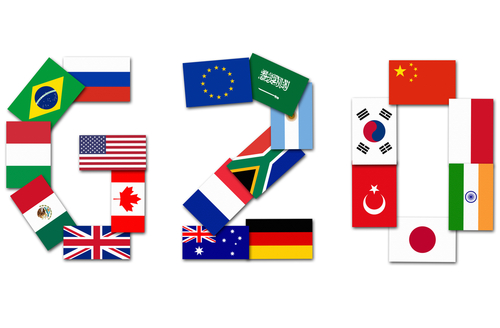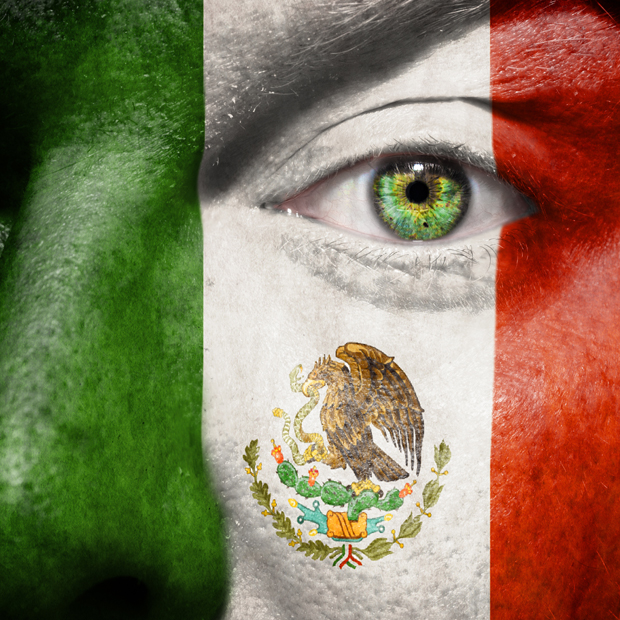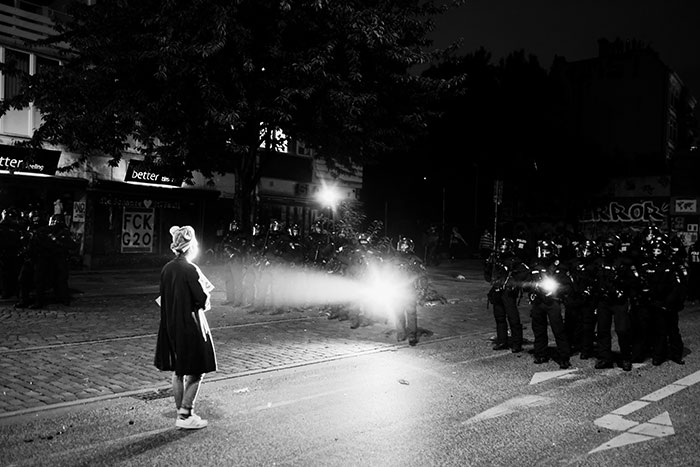4 Aug 2017 | Germany, Mapping Media Freedom, Media Freedom, media freedom featured, News and features
[vc_row][vc_column][vc_column_text]
Journalists covering the G20 Summit in Hamburg in July were subject to assaults, intimidation and some lost their accreditation, according to verified incidents documented by Index on Censorship’s project Mapping Media Freedom.
Several journalists reported that they were assaulted by police while covering protests against the meeting, which included leaders of the 19 largest industrial nations in the world plus the EU. Leading up to the summit, freelance journalist Martin Eimermacher was assaulted while police were clearing a protest camp in Hamburg on 2 July, according to Netzpolitik and Jetzt.
Police had demolished protesters’ tents when Eimermacher tried to leave the area, telling police he felt unwell. He said that officers pushed him and several other journalists to the centre of a field. He showed his press card, which was slapped out of his hand by a police officer who then pepper sprayed him.
“In my opinion the most dangerous thing is that this sets an example within Germany and beyond, that such treatment of journalists is acceptable,” Mapping Media Freedom Germany correspondent Pascale Müller said. “There seemed to have been, on an individual level of police officers, a severe lack of understanding of the rights of the press and their role as an observer and part of a healthy democracy.”
On 7 July, ITN News journalist Flo Smith, his producer and cameraperson were all pepper sprayed by police. Photojournalist Henry Langston of Vice UK was struck by a police water cannon. RT UK published a video in which police assaulted and injured photojournalist Zino Peterk, who later had to go to the hospital for his injuries.
On 8 July, Spiegel Online photographer Chris Grodotzki said police assaulted him with pepper spray while he was covering protests in Schulterblatt. Taz reporter Martin Kaul sustained minor injuries when he was hit by protesters while live-streaming the demonstration, according to Deutschlandfunk. Müller noted that some attacks by protesters targeted journalists they perceived as right-wing, “but in some cases it seems that people were already so ‘high on violence’ that they hurt journalists regardless of their political affiliation.”[/vc_column_text][vc_separator][vc_custom_heading text=”Media freedom is under threat worldwide. Journalists are threatened, jailed and even killed simply for doing their job.” font_container=”tag:h3|text_align:left” use_theme_fonts=”yes” link=”url:https%3A%2F%2Fwww.indexoncensorship.org%2Fcampaigns%2Fpress-regulation%2F|||”][vc_row_inner][vc_column_inner width=”1/2″][vc_column_text]
Index on Censorship monitors press freedom in Germany and 41 other European area nations.
As of 4/8/2017, there were 101 verified incidents associated with Germany in the Mapping Media Freedom database.
[/vc_column_text][/vc_column_inner][vc_column_inner width=”1/2″][vc_column_text]Index on Censorship campaigns against laws that stifle journalists’ work. We also publish an award-winning magazine featuring work by and about censored journalists. Support our work today.[/vc_column_text][/vc_column_inner][/vc_row_inner][vc_separator][vc_column_text]“Many journalists who covered the protest directly and that I have spoken to were emotionally and physically affected even a week after” Müller said. The press freedom violations were widely condemned, but according to Müller “The most shocking revelation came after the protests, when Sueddeutsche Zeitung revealed that the BKA had monitored selected journalists during their summit coverage over the past 10 years. This was very disturbing and lead to a certain level of insecurity within the profession. “
Other journalists reported the use of intimidation tactics by police. In the Schanze neighbourhood, Frank Schneider, a reporter for Bild, tweeted that police told journalists to “leave or you’ll go to the hospital”. F-Mag journalist Wiebke Harms reported on Twitter that police in Schanze told her: “Your press card is worth nothing.” Freelance journalist Reuben Neugebauer was told “now press freedom is over”.
Thirty-two journalists had their accreditation revoked by federal police on 7 and 8 July. German government spokesperson Steffen Seibert cited ‘security concerns’ as the rationale for the loss of access to the summit.
Journalists who lost accreditation include the photographer Björn Kietzmann, Rafael Heygster (Weser Kurier), photographer for Junge Welt, Willi Effenberger Alfred Denzinger (Beobachter News), photographer Chris Grodotzki (Spiegel Online), Adil Yigit (Avrupa Postasi), editor Elsa Koester (Neues Deutschland) and freelance photographer Po Ming Cheung.
When trying to enter a press area, Grodotzki and Yigit were told by police that their accreditation was no longer valid. Photographers Björn Kietzmann for Weser Kurier and Rafael Heygster were also not allowed to enter the press area.
Müller does not think that this treatment will intimidate journalists into stepping back from events like this in the future. “Quite the opposite, I think that many journalists and their outlets are quite resilient against such types of violence or blocked access. G20 brought press freedom issues to the forefront in Germany and made journalists even more aware of their role as critical observers, even in the middle of such violent tension and intimidation attempts.”[/vc_column_text][/vc_column][/vc_row][vc_row][vc_column][vc_basic_grid post_type=”post” max_items=”12″ style=”load-more” items_per_page=”4″ element_width=”6″ grid_id=”vc_gid:1501833910854-5bf94268-20d1-5″ taxonomies=”77″][/vc_column][/vc_row]
29 Aug 2013 | News and features
 As global power starts to shift both South and East, and the G20 overshadows the G8, will freedom of speech and broader human rights still receive support around the summit tables?
As global power starts to shift both South and East, and the G20 overshadows the G8, will freedom of speech and broader human rights still receive support around the summit tables?
While the BRICS – Brazil Russia, India, China, and South Africa – range from active democracies to repressive authoritarian states, none are keen to take lectures from western countries on free speech.
And whistleblower Edward Snowden’s still unfolding NSA and GCHQ revelations are surely weakening the US and UK’s credibility in promoting rights internationally. Mass surveillance of digital communications undermines free speech online: monitored conversation is not free, as anyone from Iran or China can attest.
Nor are the democratic BRICS yet taking any international lead on free speech and other rights.
If free speech is to be actively defended in the multipolar order, both the emerging democratic powers and the older western powers must stand up, however imperfectly, for rights, at the UN, the G20 or in bilateral dialogues, and not let economic interest, security priorities, and diplomatic convenience hold sway.
Some European diplomats confidently see the EU, US and Japan as the prime defenders of free speech, while Brazil, India and South Africa are “swing” states to bring on side against China and Russia. But from digital to media freedom to transparency and corruption, the picture is more blurred.
The Snowden revelations risk seriously weakening the US’s credibility in pushing for digital freedom and an open internet against a joint Russia-China quest for top down global internet control. The geopolitics of internet governance were exposed at an international telecommunications summit in Dubai last December – Russia and China pulling almost 90 countries including Brazil and South Africa behind them in a test vote. India wobbled before joining the US, EU and Japan.
But efforts to get democratic BRICs to support an open internet may now falter. ‘Do as we say, not as we do’ is never the most convincing of arguments.
Digital freedom may retreat further if the NSA scandal prompts a more rapid fragmentation of the internet as some fear. While Iran and China already seek to segment their national internets, if the EU and others respond with moves to insulate their networks more from the US then fragmentation may gather speed.
Yet direct censorship of the internet – imposing blocks and filters – is much more common in authoritarian regimes – with China and its great firewall targeting free speech extensively in ways not seen in the multipolar democracies.
But there are some troubling trends. Both the UK and India criminalise ‘grossly offensive’ comment on social media – with arrests for Facebook posts and tweets in both countries . And Brazil and India often top the lists in Google’s regular transparency reports on takedown requests for online content.
On press freedom, the picture for western democracies is fairly positive: they are ahead of the democratic BRICS who are, unsurprisingly ahead of Russia then China. But it’s a varied picture – Germany and the US are substantially ahead of the UK and France, with South Africa coming in just ahead of Japan according to Reporters without Borders press freedom index – and then Brazil and India trail behind. And such indicators cannot reflect the granular reality of Obama’s prosecution of media sources, or the UK debate on statutory press regulation.
At the international level, western countries are often seen as readier to challenge individual countries’ human rights records, than India, Brazil and South Africa. Yet Brazil and India voted with the US criticising Sri Lanka’s record earlier this year while Japan abstained. And the EU and US can hesitate too in the face of economic interests not least in dealings with China.
Transparency and corruption is where western countries do best. The US, Japan, Germany, France and the UK all score fairly high up on Transparency International’s annual ranking, while Brazil and South Africa languish in the middle, India is behind China, and Russia scores even below China (and India) too. But the US and UK’s transparency record will surely be reassessed given Snowden’s leaks.
With this mixed record of the democratic powers, will we hear less about free speech and human rights in the multipolar, digital world? At least, with whatever flaws and double standards, the majority of the G20 are democracies with robust debates on free speech at home. But the revelations of mass digital surveillance now cast a long shadow.
Perhaps one more positive outcome of the US’s stumbling over mass surveillance will be if it gives India, Brazil and South Africa the confidence to speak out strongly on the international stage including holding western players more to account on free speech. If so the multipolar democracies would then have more, not less, credibility in pointing the finger at authoritarian regimes.
Read more about the multipolar challenge to free expression in the current issue of Index on Censorship magazine
27 Aug 2013 | Index Reports, Mexico, News and features

(Photo illustration: Shutterstock)
Mexico was transformed in 2000, when the National Action Party, PAN, was elected to power, ending a 70 year control by the Institutionally Revolutionary Party, PRI.
During the PRI years, self censorship was rampant in the country, as the government imposed a heavy handed control of the national media. PAN candidates ruled for the next 12 years, from 2000 to 2012. But the PRI returned to power last December, due to electorate fatigue with former President Felipe Calderon’s war on drugs.
The country has faced increasing challenges from organized crime gangs that were targeted during the Calderon government and it has had serious impacts on press freedoms in the Mexican provinces, where most media recoiled from reporting on organized crime-related violence.
In the move to control organized crime groups, the Mexican government has increased its surveillance capacity. It has also engaged in human rights violations, which according to international organizations, such as Human Rights Watch, have only exacerbated the security situation.
There is little media regulation and zero artistic censorship. But in the name of protecting the state from organized crime, the government has introduced various edicts and laws that could affect the rights of citizens.
In March 2012, the Mexican Congress approved new legislation that gave police more access to online information. Also between 2011 and 2012, the Secretariat of National Defense, which controls the Mexican Armed Forces, purchased advanced domestic surveillance equipment. The new equipment includes mobile phone and online communications software that can be openly used to monitor Mexican citizens.
In 2012, the government of the State of Veracruz introduced a public nuisance law that sends to jail any social media member who uses Twitter or Facebook to warn fellow citizens about violence. The law was set in place because two Twitter users warned state residents of shootouts that turned out to be false alarms, but had the city of Veracruz traumatized by the alleged reports. The problem remains that bloggers, and social media users have become alternative sources of information because the traditional media in at least half of the territory of Mexico are afraid of reporting on drug related violence.
Drug traffickers also retaliated against social media users. They killed at least two bloggers in the northern state of Taumalipas and also two Twitter users, whose bodies were never identified and were found hanging from a bridge overpass. Two websites that made a name for themselves by running stories and reports on drug trafficking activities around the country were forced to shut down because of direct attacks.
Twitter, Facebook and YouTube have been extremely useful sources of information in Mexico. Abuses of authority against indigenous people or by children of the powerful and well-connected have been exposed in videos that turn viral in the web and have helped to right wrongs that would have gone unnoticed otherwise.
Several laws have been passed that are supposed to help people affected by the war on drugs. There is a General Victims law that was approved by Congress by which is still not implemented. Similarly, Congress approved a federal protection mechanism for human rights defenders and journalists, but the law has been criticized by freedom of the press organizations, as having few resources and focus.
Mexico declared federal defamation laws illegal in 2007, however, about a dozen states still have those on the books. At the federal level, a person can still sue an author for moral damage. At least two critical book writers, who have written books accusing government officials of corruption, have been hit with lawsuits in the last two years.
Media ownership remains potent in Mexico. Several dozen national newspapers are published daily, and many more digital news outlets have opened in the last two years.
What was not opened until June 2013 was broadcast media. Only two news outlets were for long able to transmit television signals nationally through open television channels. They were Televisa and Television Azteca, which are owned by two of Mexico’s wealthiest citizens. However, with a new Telecommunications law that was approved by Congress in June 2013, Mexico will be able to have two more open signal channels. Another wealthy Mexican, Carlos Slim, who owns an internet-based television network called Uno Noticias will probably benefit from the new law. The new legislation will also promote the installation of a broadband Internet network nationwide.
There are 41 million Mexicans who use the internet, according to the Mexican Association of Internet. The states with the highest number of internet users are in Mexico City, State of Mexico and State of Jalisco. The average daily use of the web ranges from four hours to nine minutes. More than 90 percent of all Mexicans using the internet also use social media.
Artistic Freedom
Artists have enjoyed unprecedented freedom to be creative in Mexico. The only problem lies with the commercial theatre network, which tends to not keep Mexican made movies long enough in exhibition. One movie that is critical of the legal system in Mexico City and the tradition by local police of grabbing innocent people and accusing them of murder and other crimes, Presumed Guilty, has faced serious challenges because of what appears to be an alleged concerted campaign by a Mexico City legal group that has stopped the film from showing in the country because of multiple lawsuits brought on by people who are shown on the film, and who never signed an agreement to appear in the movie.
This article was originally published on 27 Aug, 2013 at indexoncensorship.org
23 Aug 2013 | Campaigns
Index on censorship has called upon the G20 countries to put free speech on the agenda when they meet in Saint Petersburg, Russia for a summit on 5-6 September.
Index on Censorship Campaigns and Policy Director Marek Marczynski said:
“The G20 should not solely be about advancing economic development but also about advancing the human rights of citizens within the G20 and beyond. Following recent revelations about mass surveillance by the US, the UK and other countries, it is more important than ever that they clearly express their commitment to freedom of speech, the freedom of the media and individuals’ rights to privacy. The G20 should be on the forefront of protecting those rights and freedoms in their own countries and globally.”
Files leaked by whistleblower Edward Snowden have revealed the extent of surveillance by the NSA in the US and GCHQ in the UK. It is time for the G20 leaders to be transparent about the activities they carry out in the name of national security and consider the impact that they have on their citizens. Any measures to restrict freedom of speech, privacy and other human rights in the name of the fight against terrorism should be within the permissible legal limits. They can only be justified if they are necessary in a democratic society.
In the lead up to the summit, Index has been publishing articles exploring the free expression records of some of the G20 nations. The ongoing series can be found here.


 As global power starts to shift both South and East, and the G20 overshadows the G8, will freedom of speech and broader human rights still receive support around the summit tables?
As global power starts to shift both South and East, and the G20 overshadows the G8, will freedom of speech and broader human rights still receive support around the summit tables?